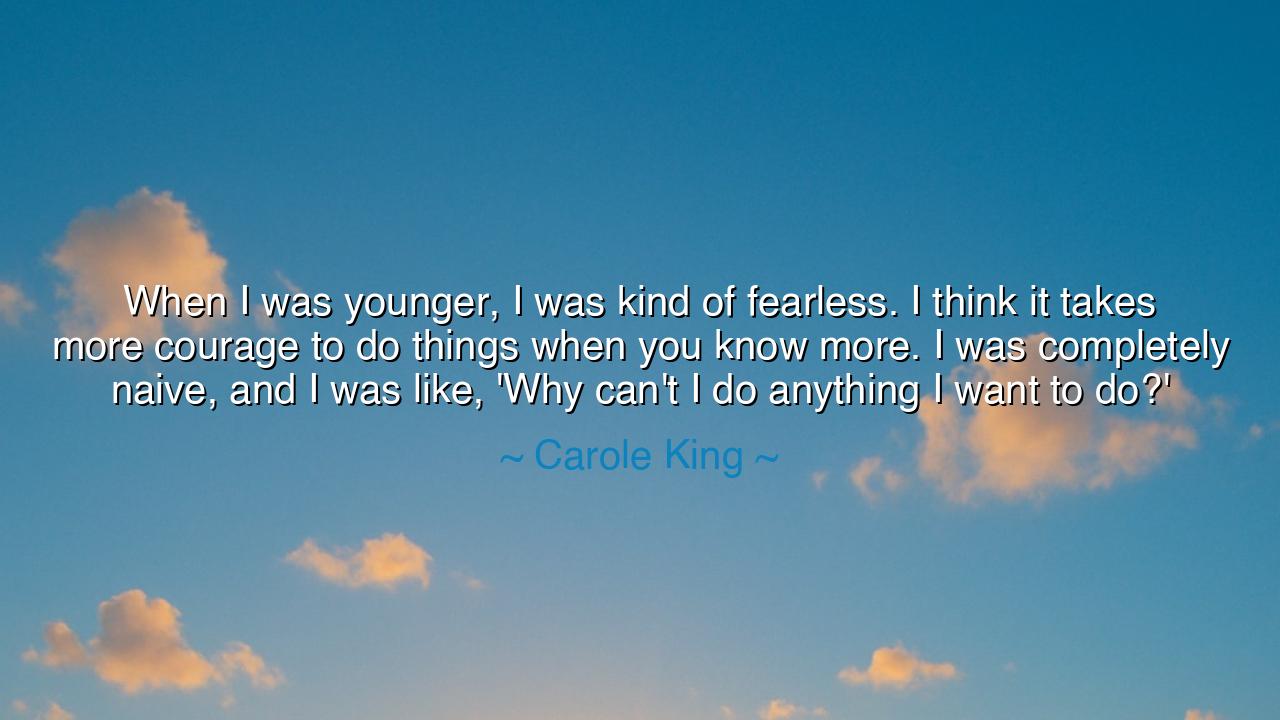
When I was younger, I was kind of fearless. I think it takes more
When I was younger, I was kind of fearless. I think it takes more courage to do things when you know more. I was completely naive, and I was like, 'Why can't I do anything I want to do?'






The wise and soulful musician Carole King, whose songs have long touched the hearts of millions, once said: “When I was younger, I was kind of fearless. I think it takes more courage to do things when you know more. I was completely naïve, and I was like, ‘Why can’t I do anything I want to do?’” In these words lies a profound reflection on the evolution of courage — on how bravery transforms from the impetuous boldness of youth into the quiet, deliberate strength of maturity. King, who lived through fame, hardship, and rebirth, teaches us that true courage is not the absence of fear, but the triumph of wisdom over it.
When we are young, fearlessness often arises not from bravery but from ignorance. We do not yet understand the cost of failure, the pain of loss, or the weight of responsibility. Like a child standing before the sea, we rush into the waves believing we are invincible. This innocence is beautiful, but fleeting. As Carole King grew older, she discovered what the ancients long understood — that wisdom deepens fear, and that it takes greater strength to act once we have known pain. Naïve courage is effortless; mature courage is earned. It is the courage that comes when one knows the risks and acts anyway.
Carole King’s own life mirrors her insight. In her youth, she rose to fame writing songs like Will You Love Me Tomorrow and Natural Woman, capturing the heartbeat of an entire generation. Yet her journey was not without sorrow — heartbreak, self-doubt, and the weight of fame tested her spirit. In time, she learned that to step forward again, to sing anew after the applause had faded, required a courage far greater than she’d known as a girl. She had to face not only the world, but herself — her limitations, her fears, her aging voice, her vulnerability. And still she sang. That, she tells us, is real courage: to dare when you understand the cost.
The ancients would have understood her perfectly. The philosopher Aristotle wrote that courage is the mean between cowardice and recklessness — not blind boldness, but reasoned resolve. The young leap without knowing the cliff is high; the wise leap knowing it may break them, yet leap all the same. This, Carole King suggests, is the bravery that matters most: not the reckless fire of youth, but the steady flame of experience. It is easy to charge forward when we know nothing of failure; it is divine to advance having tasted it.
History gives us many who have lived this truth. Consider Eleanor Roosevelt, who as a young woman was shy, unsure, and overshadowed by doubt. Yet through loss, betrayal, and political storms, she became a beacon of courage — speaking for human rights, justice, and compassion when the world was divided by fear. She once said, “You gain strength, courage, and confidence by every experience in which you really stop to look fear in the face.” Like Carole King, she understood that the more we know, the braver we must become. The courage of the wise is a heavier burden, for it carries the memory of pain.
There is, then, a kind of holiness in growing older and still daring to dream. To act with courage after knowledge is to stand as a warrior of the spirit — one who has learned that perfection is a myth, that loss is inevitable, yet that life is still worth the struggle. The young fight for victory; the wise fight for meaning. And it is the latter that changes the world. Carole King’s words remind us that maturity is not the death of courage, but its awakening.
So, my child, take this truth and hold it close: fearlessness is easy, but courage is sacred. When you were young, you ran because you did not yet know the dangers ahead. When you are older, you will walk — not because you are weaker, but because you have learned to walk with care. Do not despise the fear that comes with wisdom; it is the shadow of understanding. Act, even when you tremble. Sing, even when your voice shakes. For it is in those moments, when you act not out of ignorance but in full awareness of life’s weight, that you become what Carole King and all the wise before her have known — truly brave.






AAdministratorAdministrator
Welcome, honored guests. Please leave a comment, we will respond soon